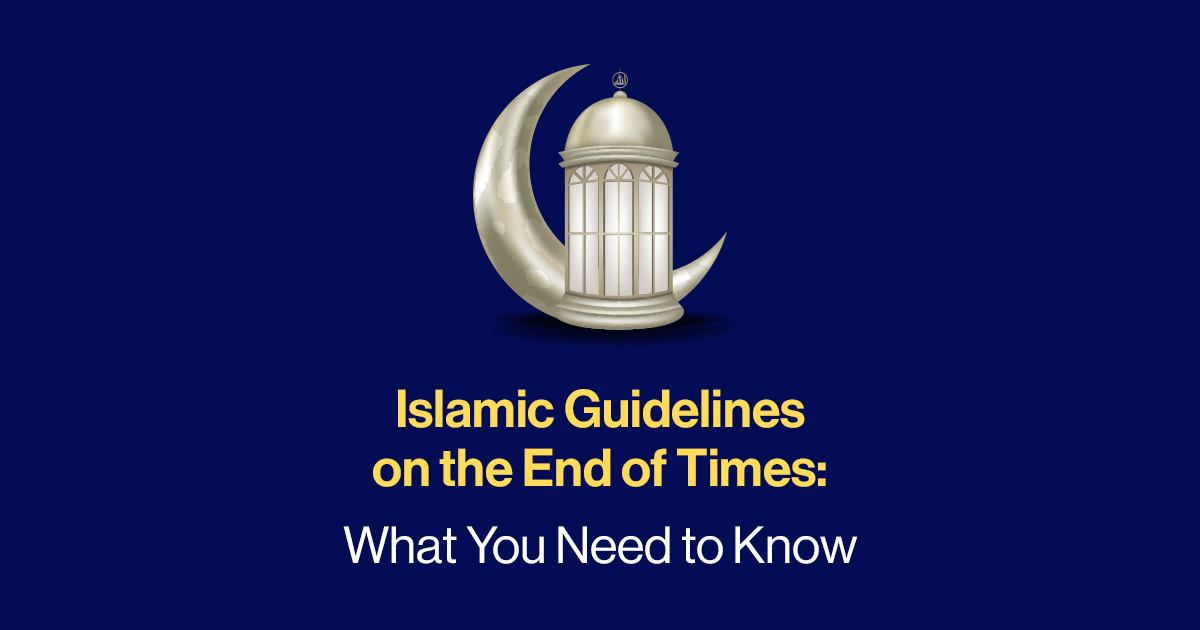Explore the key Islamic beliefs about the End of Times, including signs of the Day of Judgment, the role of Dajjal, the return of Isa (Jesus), and how to prepare. A full guide based on Islamic eschatology.
Introduction
In Islam, understanding the end times is crucial for every believer. This knowledge helps us prepare for the future and strengthen our faith. Let’s explore the Islamic view on the end of times, based on the Quran and authentic Hadith.
What is Islamic Eschatology?
Islamic eschatology is the study of the end times in Islam. It covers events that will happen before, during, and after the Day of Judgment (Yawm al-Qiyamah). The Quran and Hadith are our main sources for this knowledge.
The Day of Judgment: A Key Concept
The Day of Judgment is when Allah will judge all souls. It’s a central belief in Islam. On this day:
- The dead will rise
- Everyone’s deeds will be weighed
- People will enter Paradise or Hell
Understanding this day helps us live better lives now.
Signs of the Hour: What to Look For
The Quran and Hadith mention many signs of the approaching end times. These are called the Signs of the Hour (Ashrat al-Sa’ah). Some key signs include:
- The coming of the Dajjal (False Messiah)
- The return of Isa (Jesus)
- The appearance of Yajuj and Majuj (Gog and Magog)
- The rising of the sun from the west
These signs warn us to be ready and strengthen our faith.
Trials and Tribulations
The end times will be full of tests (Fitna). These may include:
- Natural disasters
- Wars
- Loss of faith
Muslims must stay strong and keep their faith during these hard times.
Preparing for the End Times
To be ready for these events, Muslims can:
- Learn more about Islamic teachings
- Follow the Quran and Sunnah
- Be kind and just to others
- Remember Allah often
“But those who were given knowledge and faith will say, “You remained the extent of Allah ‘s decree until the Day of Resurrection, and this is the Day of Resurrection, but you did not used to know.” (Quran 30:56)
Major and Minor Signs of the End Times
In Islamic teachings, the signs of the end times are divided into two categories: minor signs and major signs. Understanding these signs helps Muslims prepare spiritually and mentally for the challenges ahead.
Minor Signs of the End Times
Minor signs are events that occur gradually over time, often without people noticing their significance. These signs include:
1. Increase in Immorality and Corruption
As we approach the end times, Islamic teachings warn of a rise in immoral behavior and corruption. This includes:
- Widespread adultery and fornication
- Increase in alcohol consumption
- Normalization of usury (interest)
The Prophet Muhammad (peace be upon him) said: “From among my followers there will be some people who will consider illegal sexual intercourse, the wearing of silk, the drinking of alcoholic drinks and the use of musical instruments, as lawful.” (Sahih al-Bukhari)
2. Widespread Injustice and Tyranny
Another minor sign is the spread of oppression and unfairness in society. This may manifest as:
- Unjust rulers
- Discrimination against minorities
- Economic exploitation
Muslims are encouraged to stand against injustice, even in difficult times.
3. People Competing in Building Tall Structures
This sign refers to pride in worldly achievements, particularly in architecture. We see this today in the race to build the tallest skyscrapers.
The Prophet (peace be upon him) said: “The Hour will not be established until people compete with one another in constructing tall buildings.” (Sahih al-Bukhari)
4. Knowledge Being Taken Away
This sign refers to the loss of religious knowledge, often through the death of scholars. It reminds us to:
- Seek knowledge while we can
- Respect and learn from scholars
- Preserve Islamic teachings
Major Signs of the End Times
Major signs are dramatic events that will occur close to the Day of Judgment. They include:
1. Appearance of Dajjal (the False Messiah)
The Dajjal is a figure who will claim to be divine and mislead many people. Muslims should:
- Learn about the Dajjal’s characteristics
- Strengthen their faith to resist his temptations
- Seek refuge in Allah from the Dajjal’s trials
2. Return of Isa (Jesus)
Isa’s return is a major event in Islamic eschatology. He will:
- Defeat the Dajjal
- Establish justice on Earth
- Lead people to the true path of Islam
This event highlights the importance of Isa in Islam and the unity of divine messages.
3. Emergence of Gog and Magog (Yajuj and Majuj)
Gog and Magog are two groups mentioned in the Quran who will cause great destruction. Their appearance signals that the end is near.
“Until when [the dam of] Gog and Magog has been opened and they, from every elevation, descend.” (Quran 21:96)
4. The Beast of the Earth
The Beast (Dabbat al-Ard) will emerge and mark believers and non-believers. This event will make faith visible and undeniable.
5. The Rising of the Sun from the West
This miraculous event will be a clear sign of the approaching Day of Judgment. It will mark the time when repentance will no longer be accepted.
The Prophet (peace be upon him) said: “The Hour will not be established until the sun rises from the West.” (Sahih al-Bukhari)
Understanding these signs helps Muslims stay vigilant and focused on their faith. It’s important to remember that our main goal is to please Allah, regardless of when these events occur.
For those seeking to deepen their knowledge about the signs of the end times, Darussalam offers a wide range of authentic Islamic books. These resources can help you understand these concepts better and strengthen your faith in preparation for the challenges ahead.
Key Figures in Islamic End Times
Islamic teachings mention several important figures who will play crucial roles during the end times. Understanding these key figures helps Muslims prepare for future events and strengthens their faith.
Dajjal: The False Messiah
The Dajjal is a figure who will test people’s faith through deception and seeming miracles. Key points about the Dajjal include:
- He will claim to be divine
- He will have miraculous powers to mislead people
- He will cause great trials and tribulations
Muslims are advised to seek protection from the Dajjal’s trials by reciting specific prayers and strengthening their faith.
Isa’s (Jesus’) Return
The return of Isa is a major event in Islamic eschatology. According to Islamic teachings, Isa will:
- Descend near Damascus
- Defeat the Dajjal
- Establish justice and peace on Earth
- Lead people to true Islam
Isa’s return emphasizes the continuity of divine messages and the unity of Abrahamic faiths.
Imam Mahdi: The Righteous Leader
The Mahdi, a righteous leader from Prophet Muhammad’s lineage, will appear in Makkah before the Day of Judgment. He will restore justice, unite Muslims, and prepare for Isa’s (Jesus’) return. Working alongside Isa, the Mahdi will play a crucial role in defeating the Dajjal and establishing a period of peace and true Islamic governance on Earth. He will:
- Appear in Makkah
- Lead Muslims in prayer
- Work alongside Isa to establish justice
His leadership will be a time of great blessings for the Muslim Ummah.
The Resurrection and Judgment Day
The Day of Judgment (Yawm al-Qiyamah) is a central belief in Islam. It marks the end of this world and the beginning of eternal life.
The Event of Resurrection
On this day, all souls will be resurrected physically and spiritually. This includes:
- The blowing of the trumpet by the angel Israfil
- The rising of all souls from their graves
- The gathering of all humans for judgment
The Judgment Process
Allah will judge each person based on their deeds. This process includes:
- Presenting each person’s Book of Deeds
- Weighing good and bad deeds on a divine scale
- Questioning about one’s actions in life
“And We place the scales of justice for the Day of Resurrection, so no soul will be treated unjustly at all. And if there is [even] the weight of a mustard seed, We will bring it forth. And sufficient are We as accountant.” (Quran 21:47)
The Final Reckoning
Based on the judgment, people will enter either:
- Paradise (Jannah): A place of eternal bliss for the righteous
- Hell (Jahannam): A place of punishment for those who rejected faith and did evil
Importance of Repentance
Islam emphasizes the importance of repenting before it’s too late. Once the sun rises from the West, a major sign of the end times, the door of repentance will close.
How to Prepare for the End of Times
Preparing for the end times is an essential part of a Muslim’s life. Here are some practical steps:
Follow the Sunnah and Maintain Faith
- Study and implement the teachings of Prophet Muhammad (peace be upon him)
- Strengthen your belief in Allah and the Day of Judgment
- Practice Islam consistently in daily life
Practical Steps for Spiritual Preparation
1. Repentance and Asking for Forgiveness
- Make istighfar (seeking forgiveness) a daily habit
- Sincerely repent for past sins
- Strive to avoid repeating mistakes
2. Performing Good Deeds
- Increase in charity and kindness
- Fulfill religious obligations like prayer and fasting
- Help others and spread positivity in society
3. Strengthening Knowledge of Islam
- Study the Quran and its interpretation
- Learn about the signs of the end times from authentic sources
- Attend Islamic classes or lectures to deepen understanding
The Prophet (peace be upon him) said: “Whoever reads the last two verses of Surah Al-Baqarah at night, they will suffice him.” (Sahih al-Bukhari)
By focusing on these aspects, Muslims can better prepare themselves spiritually for the challenges of the end times and the Day of Judgment.
Lessons from Islamic Eschatology
Islamic teachings about the end times offer valuable insights that can guide our daily lives. These lessons help us focus on what truly matters and prepare for the eternal life to come.
Moral and Ethical Lessons
- Accountability: The Day of Judgment reminds us that we’re responsible for our actions. This encourages ethical behavior and self-reflection.
- Justice: Allah’s perfect justice on the Day of Judgment teaches us to strive for fairness in our own lives.
- Compassion: Knowing the trials of the end times should make us more compassionate towards others who may be struggling.
“So whoever does an atom’s weight of good will see it, and whoever does an atom’s weight of evil will see it.” (Quran 99:7-8)
The Purpose of Life
Islamic eschatology highlights that this world is temporary. It teaches us to:
- Focus on our true purpose: worshipping Allah
- Avoid excessive attachment to worldly possessions
- Strive for good deeds that will benefit us in the Hereafter
Remaining Steadfast in Faith
The trials of the end times remind us to:
- Strengthen our faith regularly
- Seek knowledge to protect ourselves from misguidance
- Support and encourage each other in righteousness
Conclusion
As we conclude our exploration of Islamic guidelines on the end times, let’s recap the key points:
Key Figures and Events
- Dajjal: The false messiah who will test believers’ faith
- Mahdi: The guided leader who will restore justice
- Isa (Jesus): His return will mark a time of peace and true guidance
- Major Signs: Events like the rising of the sun from the west that signal the approaching Day of Judgment
Living with Mindfulness of the Hereafter
Understanding these end-time events should inspire us to:
- Live each day as if it could be our last
- Balance our worldly needs with our spiritual growth
- Constantly seek Allah’s pleasure in our actions
Allah’s Mercy and Justice
Even in the challenging times ahead, we’re reminded of Allah’s attributes:
- His mercy, which is open to those who sincerely repent
- His justice, ensuring that every soul gets its due
- His wisdom in the timing and nature of these events
In conclusion, Islamic teachings about the end times serve as a powerful reminder of our purpose in this world. They encourage us to live righteously, prepare for the Hereafter, and trust in Allah’s plan. By understanding these guidelines, we can face the future with hope, faith, and determination to be among those who succeed on the Day of Judgment.
For those seeking to deepen their understanding of Islamic eschatology, Darussalam offers a wide range of authentic books on this topic. From detailed Hadith collections to scholarly works explaining the signs of the Hour, these resources can help you gain a more comprehensive understanding of what lies ahead and how to prepare for it.





